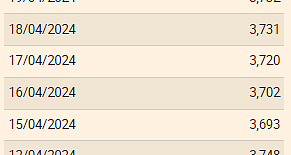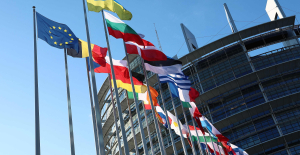The advice was to talk, before it was written. In the economic Commission of the national Council (WAK) has demanded that the SP national councillor Corrado Pardini already in December, that two legal opinions will be posted on the institutional framework agreement with the EU (InstA). One of Philipp and one by Carl Baudenbacher. It should be clarified how large the discretion of the arbitral Tribunal is in response to a request of the EU, the European court of justice (ECJ) to call, and what impact the agreement will have on state aid. Both reviewers are set against the InstA-critical. Baudenbacher, former President of the Efta court referred to the court of arbitration as a Fig leaf, Zurkinden has referred to the consequences of the agreement for state aid to a very large extent. Therefore, the center parties referred to them as the party and questioned the financing of the opinions in question.
Now Baudenbachers opinion. Actually, it is a secret, but it has found the way to the Sunday newspaper. The question Baudenbacher was: "How big is the discretion of the arbitral Tribunal, if it is from the EU will ask the European court of justice (ECJ) to call?" The aims at the heart of the InstA because it goes to the arbitration in the dispute. Originally, the Switzerland wanted to accept the ECJ as the Legal authority and the right to take its Decisions not to implement. This is at the cost of punitive measures. A year ago, Switzerland swung to a quote from EU President Jean-Claude Juncker, a court of arbitration between. This must, however, when it comes to EU law, the ECJ calls. Whose judgment is binding.
The court of arbitration was an "impermissible tinkering"
Similar arbitration courts of the EU with Georgia, Moldova and Ukraine. The failure of the Brexit Deal to a court of arbitration was also provided. Only if this arbitration, courts have a discretion, they will make from the point of view of the Switzerland of sense.
The right question to reviewers, Carl Baudenbacher and his answer in the Original. The full report is available here.
The answer Baudenbachers is clear: The arbitration court "has no discretion", "Switzerland submits to the court the opposite party, it does not bring any improvement compared to the pure ECJ-model" and "the submission will have an impact on Switzerland's Position in future negotiations with the EU." The reasons: first, from a comparative point of view, it is impermissible tinkering ("bricolage"), if a procedure has been developed for Association agreements of EU-candidate countries, will suppresses a discharge consent country like Britain or a country without a candidate's intention, such as Switzerland.
Although there is, secondly, a different language technology. In the Swiss agreement, the arbitral Tribunal "to call in the event that disputes of EU law is concerned, the ECJ", in the case of the Eastern Europeans submit "(to the ECJ) before" and the British "must request (to the ECJ for a judgment)". "You can't accept that there is a some kind of discretion," says Baudenbacher, and cited the English law experts, Martin How, who speaks of the "Vassal", and says further: "the InstA third in this point, the state would be friendly to be construed as the agreement with Georgia, Moldova and Ukraine, there is no point of reference." Wherever it comes to EU law, claim of the ECJ in anyway a monopoly.
Pardini and Aesch defend the opinion
The only significant difference Baudenbacher found in the provision that in the Swiss court of arbitration, in which officials are allowed to sit. A further weakness of the arbitration court is that it will always be set and re-assembled, could not be legal tradition. It is often argued that the ECJ is a good court and it would therefore be not a tragedy, if Switzerland had to accept his judgments. As Baudenbacher argues that the Federal Council fear that he might be forced by the ECJ to take on the controversial Union citizens Directive, although not mentioned in the agreement.
According to Pardini, the work of Baudenbacher is important: "The Commission is charged in accordance with the regulations, are free to appoint a reviewer, to put in such an extraordinary and complex matter. All the more, as the us, the Federal Council has passed the hot potato, and a final assessment calls." To do this, Baudenbacher was exactly the Right thing to do. The SVP national Council Thomas Aeschi: "It is justified, in my view, to hire a proven expert how Baudenbacher with an opinion. Who could have done better, after all, he has more than 20 years of experience as a judge at the Efta court."
(Sunday newspaper)
Created: 10.02.2019, 07:36 PM

 The Euribor today remains at 3.734%
The Euribor today remains at 3.734% Germany: the trial of an AfD leader, accused of chanting a Nazi slogan, resumes this Tuesday
Germany: the trial of an AfD leader, accused of chanting a Nazi slogan, resumes this Tuesday New York: at Columbia University, the anti-Semitic drift of pro-Palestinian demonstrations
New York: at Columbia University, the anti-Semitic drift of pro-Palestinian demonstrations What is Akila, the mission in which the Charles de Gaulle is participating under NATO command?
What is Akila, the mission in which the Charles de Gaulle is participating under NATO command? What High Blood Pressure Does to Your Body (And Why It Should Be Treated)
What High Blood Pressure Does to Your Body (And Why It Should Be Treated) Vaccination in France has progressed in 2023, rejoices Public Health France
Vaccination in France has progressed in 2023, rejoices Public Health France Food additives suspected of promoting cardiovascular diseases
Food additives suspected of promoting cardiovascular diseases “Even morphine doesn’t work”: Léane, 17, victim of the adverse effects of an antibiotic
“Even morphine doesn’t work”: Léane, 17, victim of the adverse effects of an antibiotic MEPs validate reform of EU budgetary rules
MEPs validate reform of EU budgetary rules “Public Transport Paris 2024”, the application for Olympic Games spectators, is available
“Public Transport Paris 2024”, the application for Olympic Games spectators, is available Spotify goes green in the first quarter and sees its number of paying subscribers increase
Spotify goes green in the first quarter and sees its number of paying subscribers increase Xavier Niel finalizes the sale of his shares in the Le Monde group to an independent fund
Xavier Niel finalizes the sale of his shares in the Le Monde group to an independent fund Owner of Blondie and Shakira catalogs in favor of $1.5 billion offer
Owner of Blondie and Shakira catalogs in favor of $1.5 billion offer Cher et Ozzy Osbourne rejoignent le Rock and Roll Hall of Fame
Cher et Ozzy Osbourne rejoignent le Rock and Roll Hall of Fame Three months before the Olympic Games, festivals and concert halls fear paying the price
Three months before the Olympic Games, festivals and concert halls fear paying the price With Brigitte Macron, Aya Nakamura sows new clues about her participation in the Olympics
With Brigitte Macron, Aya Nakamura sows new clues about her participation in the Olympics Skoda Kodiaq 2024: a 'beast' plug-in hybrid SUV
Skoda Kodiaq 2024: a 'beast' plug-in hybrid SUV Tesla launches a new Model Y with 600 km of autonomy at a "more accessible price"
Tesla launches a new Model Y with 600 km of autonomy at a "more accessible price" The 10 best-selling cars in March 2024 in Spain: sales fall due to Easter
The 10 best-selling cars in March 2024 in Spain: sales fall due to Easter A private jet company buys more than 100 flying cars
A private jet company buys more than 100 flying cars This is how housing prices have changed in Spain in the last decade
This is how housing prices have changed in Spain in the last decade The home mortgage firm drops 10% in January and interest soars to 3.46%
The home mortgage firm drops 10% in January and interest soars to 3.46% The jewel of the Rocío de Nagüeles urbanization: a dream villa in Marbella
The jewel of the Rocío de Nagüeles urbanization: a dream villa in Marbella Rental prices grow by 7.3% in February: where does it go up and where does it go down?
Rental prices grow by 7.3% in February: where does it go up and where does it go down? Europeans: “All those who claim that we don’t need Europe are liars”, criticizes Bayrou
Europeans: “All those who claim that we don’t need Europe are liars”, criticizes Bayrou With the promise of a “real burst of authority”, Gabriel Attal provokes the ire of the opposition
With the promise of a “real burst of authority”, Gabriel Attal provokes the ire of the opposition Europeans: the schedule of debates to follow between now and June 9
Europeans: the schedule of debates to follow between now and June 9 Europeans: “In France, there is a left and there is a right,” assures Bellamy
Europeans: “In France, there is a left and there is a right,” assures Bellamy These French cities that will boycott the World Cup in Qatar
These French cities that will boycott the World Cup in Qatar Serie A: Bologna surprises AS Rome in the race for the C1
Serie A: Bologna surprises AS Rome in the race for the C1 Serie A: Marcus Thuram king of Italy, end of the debate for the position of number 9 with the Blues?
Serie A: Marcus Thuram king of Italy, end of the debate for the position of number 9 with the Blues? Milan AC-Inter Milan: Thuram and Pavard impeccable, Hernandez helpless… The tops and flops of the derby
Milan AC-Inter Milan: Thuram and Pavard impeccable, Hernandez helpless… The tops and flops of the derby Ligue 2: Auxerre leader, Bordeaux in crisis, play-offs... 5 questions about an exciting end of the season
Ligue 2: Auxerre leader, Bordeaux in crisis, play-offs... 5 questions about an exciting end of the season


















